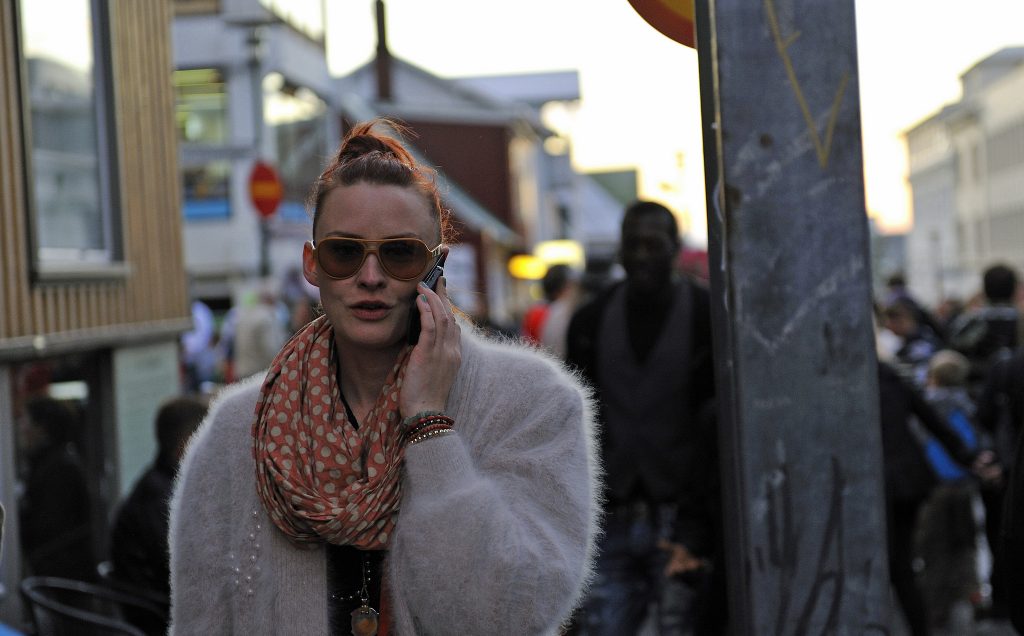Filling in your Icelandic. Posted by hulda on Jul 21, 2015 in Icelandic customs, Icelandic grammar
The one big difference between written and spoken Icelandic it would probably be this: spoken Icelandic has more words. Well – non-words, actually, more like fillers and exclamations of various types. Some are used for the typical purpose of a filler word, to patch a pause in conversation while the speaker is thinking of how to continue, some are used to strengthen whatever message is to follow and some actually have a very specific meaning, exclamations that can only be used in certain situations. Regardless, the most typical use for them is to pad the discussion to avoid awkward pauses, so let’s have a look at some of the things you can use to hide your thinking moments!
Typical fillers
Sko
Doesn’t really mean anything, just used to fill in pauses in speech, could probably be translated as “look”. You’ll hear it a lot if you’re talking with an absent-minded type of an Icelander, which can get a little annoying if you’re talking with them on the phone…
Hérna
Would mean “here” if translated according to meaning, but often just used as a tool to wedge yourself in to some conversation you find interesting. “I heard that they’re planning to build yet another hotel on Lækjargata -” “Hérna – are you sure they can even fit another one on it now?”
Þúst (= þú veist)
Technically speaking this means “you know”, and it’s used in a similar manner as the English you know – you know, to, you know, just slip it in you know, with no one actually being interested in what you know. You know. Both Þú veist and þúst are used but the shortened version is more common, especially among the young people.
Naturally nothing stops you from using all three, and there’s a type of a person who would do exactly that, a lot and often: “Sko – hérna, sko, þúst…” At worst you’re looking for a few minutes of skohérnaþúst-ing before the person actually manages to say what they wanted to tell you. 😀
Strengthening exclamations
Æ –
This one just means “oh” and has a wide variety of uses, all depending on the tone of your voice. Someone ran into some misfortune? Æ-eee with sympathy. You really want to pick a fight with someone? Æ þegiðu (= oh shut up) usually does it. It may not sound that bad but it’s actually quite a rude thing to say in Iceland, not that that ever stops anyone from using it as this example shows.
Exclamations with specific meaning
Heyrðu
“Hear, you.” Another good word to use when you want to hop into a conversation, or just plain old getting someone’s attention. A very typical way of starting any conversation, especially with a stranger.
Oj (also oj barasta)
“Ew”, no other meanings. If you say Oj/oy/oi in Iceland people will immediately think you ‘re voicing your disgust over something, so be careful if this exclamation works differently in your own language! Finns especially, while saying “oi, parasta!” (= oh, this is the best!) about food in Finland is totally fine doing the same in Iceland will backfire – oj barasta is the epitome of grossness.
Jæja
This one has to be divided into two different versions, both of which can have a very specific meaning. The first one comes with stress on the latter syllable – jæJA – and typically carries the meaning “well then”. It can be used as a friendly way of interrupting people from whatever they’re up to, or interrupting a conversation to announce something that’s not the topic. The other one has the stress in front – JÆja – and tends to mean “NOW you’ve really done it”. If you hear this version, drop whatever you’re doing and look as apologetic as possible, because whatever you just went and did did not go well with the person addressing you. Mothers have their own version of this latter jæja that has high destructive force behind it and can sweep the legs off of even the baddest, most troll-like people this country has (works best if it’s their own mother).
Filler words are quite handy by the way! If you get stuck trying to remember how to say something in Icelandic, skohérnaþúst a little and see if the extra time you won for yourself helped out. Another thing it’s useful for is figuring out what you’re going to say if you’re in a quick situation, someone asks you something and it catches you entirely unprepared; jæja for a while in a steady tone while you go through your memory storage on possible answers. However, if nothing comes up it’s good to give up before the other person begins to look pained or starts inching away from you sideways… 😀

Build vocabulary, practice pronunciation, and more with Transparent Language Online. Available anytime, anywhere, on any device.
About the Author: hulda
Hi, I'm Hulda, originally Finnish but now living in the suburbs of Reykjavík. I'm here to help you in any way I can if you're considering learning Icelandic. Nice to meet you!





Comments:
Jo:
One of my friends wrote her B.A. thesis in English about discourse analysis and chose this as the focus. She recorded and analysed the use of fillers in conversations between our group of friends. It made me aware of how much I was saying “sko” and how annoying it was. I have almost completely stopped using that filler, but I have probably replaced it with something else equally annoying.
hulda:
@Jo Oh yes, I know that feeling! 😀 At one point I had a weird habit of inserting “bara” as my every third word almost, to a point where one of my professors asked me to use “aðeins” instead. It worked in weaning me off the bad habit, aðeins is just not as natural sounding filler word as bara, though the meaning is the same!